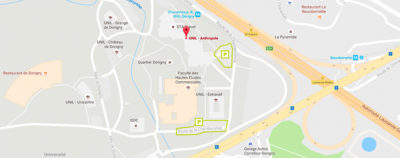This Challenge is a unique opportunity for Swiss early and extension stage tech start-ups in the fields of IT and telecommunications, Internet of Things, Big Data and Fintech – who want to conquer the world with their products or services.
News
L’innovation technologique du CHUV fait la une de la revue internationale ASAIO.
L’anneau mitral ajustable, un dispositif pour améliorer la réparation chirurgicale de la valve mitrale, conçu et développé au CHUV par le Prof. Piergiorgio Tozzi du Service de Chirurgie Cardiaque avec le soutien du PACTT, a mérité la couverture de l’édition de mars de l’ASAIO.
InnoPACTT: a financial support to create your start-up
Conference: CTI projects in Life Science: make them successful!
Do you have an innovative idea you would like to develop? The CTI, commission for technology and innovation, is the funding tool you are looking for.
The applications for two venture leaders programs are open
Venturelab, a swiss start-up Accelerator, has opened the applications for the following venture leaders programs :
Venture leaders Life Science (Boston), June 2017
For more information, please click here or download the flyer here.
Venture leaders China, July 2017
For more information, please click here download the flyer here.
Application deadline for both programs is March 5th, 2017.
The MassChallenge Switzerland applications 2017 are open
Since January 1st, Switzerland has regained the “Associated Country” status for the “Horizon 2020” EU Programme.
To read the complete newsletter from Euresearch, please click on the following link :
Protocole de Nagoya
Le Protocole de Nagoya négocié dans le cadre de la Convention sur la diversité biologique (CDB) régit l’accès aux ressources génétiques et le partage juste et équitable des avantages découlant de leur utilisation.
Read More
Season’s Greetings

Rencontrez les parcs d’innovation
Pas besoin d’être dans un technopôle pour bénéficier de l’ infrastructures et plateformes techniquement avancées des parcs d’innovations! »
Indépendamment de l’offre de bureaux et d’incubation, vous avez accès à des « outils » et compétences disponibles dans ces technopôles, sans nécessairement y être installé. Comme par exemple, utiliser une imprimante 3D métal pour du prototypage.
Présentation:
lundi 14 novembre 2016
Auditoire 1129 @ Anthropole
Université De LAUSANNE (UNIL)
Entrée libre mais inscription obligatoire.
PROGRAMME
Dès 17h30
Verre de bienvenue et remise des badges.
18h-19h
Présentation des technopôles:
Y-Parc, Biopôle, EPFL Innovation Park, Technopôle de Sainte-Croix,
TecOrbe et Ateliers de Renens.
Dès 19h
Cocktail dînatoire et démos d’entreprises basées dans les parcs d’innovation.
COMMENT ACCÉDER
Nous vous recommandons d’utiliser les transports publics:
M1 arrêt UNIL-Dorigny. Parking payant à disposition.

CONTACT
Pour toute question: contact@innovaud.ch



